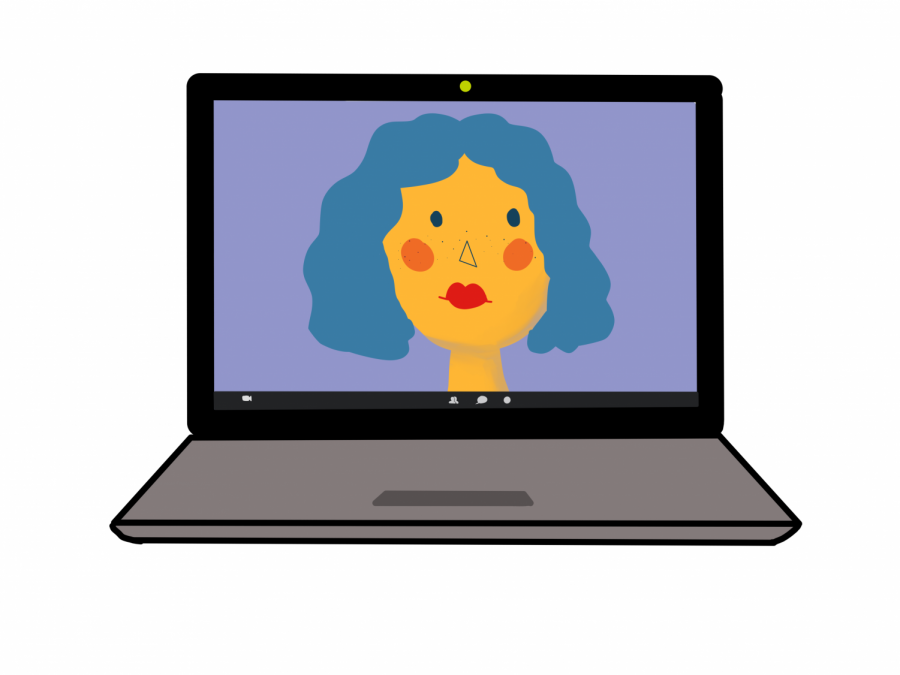Opinion | Turn your Zoom camera off
September 1, 2020
I recently discovered my new favorite Zoom feature — the turn off video button. While many students likely use it so they can check their Tinders in peace during class, I’ve discovered that it comes in handy for one very particular ailment — body-checking and overall low self-esteem.
Body-checking is a behavior most associated with low body image and eating disorders in female-presenting people, and occurs when a person “checks” on their body and weight in a mirror, scrutinizing themselves. Levels of body-checking are higher in adult women than adult men.
Now, you view yourself on Zoom as you would in a mirror. And as other writers have already mentioned, having to see yourself in a little square day by day next to other faces, faces that you’re bound to compare yourself to, isn’t exactly healthy. For women, it can be much worse due to social pressures to always appear presentable. I suggest we embrace turning our cameras off during lectures — you’ll love it, or you won’t, in which case you can blame me.
The pressure to keep up appearances is directed largely at female-presenting people, Renee Engeln, a psychology professor at Northwestern University and author of “Beauty Sick: How the Cultural Obsession with Appearance Hurts Girls and Women,” writes.
“We need to wear makeup, color or blow out our hair, do our eyebrows or lashes … Whereas men are probably missing out on some haircuts and that’s about it,” Engeln said. “So when men see themselves on a video platform, they don’t look that different. The reality of the differential demands we put on women are just showing up in a different context.”
I’ve definitely had this experience many a time during lockdown. I’d find myself apologizing for not having the energy to put on makeup in the morning, or for my hair being a mess. Then it struck me that the men in my Zoom calls never said anything like that about themselves. So why was I doing it?
I tried, first, to simply stop caring about how I look. I showed up to my first day of classes with sunken eyes and a messy bun — my go-to quarantine look — but then realized a lot of my peers didn’t have their cameras on. Some professors were okay with that, trusting we were listening even if they couldn’t visibly see us listening, nodding our little heads.
So I turned my camera off. And boy, oh boy, did some beautiful feeling overtake me. I didn’t have to see my face, didn’t have to see my double chin — so I forgot about it, forgot about my physical form, and for the first time in maybe forever I just learned. Just sat there and learned. I wasn’t worried about my classmates seeing my body, I wasn’t worried about having to stare at my body myself — I became a voice with things to say, unattached from a pesky physical form.
Inhabiting a body that presents itself to the world as a woman is a tricky time indeed. Although I try not to focus on how I look, and I know I’m in college to learn and not to be hot, it can be super hard to have judging eyes on you everywhere. Women aren’t given the same leeway that men are with looks, and it does show up in academic life.
With the option to turn the camera off, or hide my self-view, I can inhabit a space where I no longer have to fall ill to the way I’ve been socialized as a woman. We are taught that if people are watching us, if people can see us, we need to be aware of our bodies. Is my hair sticking up? I’ll fix it and not fully hear what my professor is saying, so preoccupied with my flyaways. That guy is looking at me. Let me pull my shirt hem down a bit. What was the question? My stomach is coming out of my jeans — adjust, there we go.
So although I miss in-person classes as much as the next guy and I abhor the barriers of intimacy that Zoom presents, there is one good takeaway from my Zoom time. I’ll be keeping my video off whenever I can, and maybe the staring at myself less will do me some good.
Genna Edwards writes about film, gender, and culture for The Pitt News. You can drop her a line at gee9@pitt.edu.



